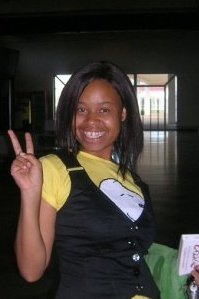Intolerance, a reflection of self
Friday, April 23rd, 2010 by Delta NdouSometimes when a person is confused and they don’t know what they want – I usually say, “Well, if you don’t have an idea what you want, at least tell me what you don’t want.”
The same goes for those facing some kind of inner struggle, identity crisis or such dilemma – I often tell them if they don’t know who they are, at least they ought to know who they don’t want to be.
The things we negate often are a reflection of what we instinctively embrace as our values, extol as virtues and they are indicative of our deeply held convictions.
I believe a scrutiny of our cultural beliefs, of the things we were socialized to reject will always be reflective of what we consider to be normal, acceptable and appropriate.
So our intolerances are a reflection of self – a reflection of who we are essentially.
Bigotry often derives from our revulsion towards that which is inconsistent with our belief system; it is like a knee-jerk reaction to that which contradicts our worldview or our interpretation of the world.
Anything that does not align with our own prejudiced perception is like a smudge marring the lens we use to view our world and we seek to obliterate it so that we may continue to enjoy the same view we are accustomed to – the status quo upheld.
The homophobia that currently informs the discourse on homosexuality in Zimbabwe is a case in point, reflecting the deeply ingrained cultural and social beliefs of what manhood entails – for what repulses many is not lesbianism but rather gays.
For a man to sleep with another man is almost inconceivable to most people and to those who can conceive of it – it is like an abomination.
And as a collective people pride themselves in holding on to these prejudices, tacitly condoning hate speech and other abusive reactions that have been central to the backlash created by the debate on homosexuality.
Of late, the media has been awash with reports of pedophilia in the Roman Catholic Church – narratives of how young boys have fallen prey to unscrupulous members of the clergy who fail to curb their ‘appetites’ and resort to feeding off the proverbial flock.
The allegations also point to a systematic cover-up by sections of the church’s leadership to shield the perpetrators, silence the victims and protect the all-important image of the church.
The Pontiff, having been so vocal on the issue of condom use, reinforcing the church’s unyielding anti-contraceptive position has been rather subdued on the subject only recently making a show of weeping with the victims of abuse – a gesture many feel is contrived.
It worries me that these attitudes are prevalent even in our own societies, that perpetrators of child abuse or molesters will find a sympathetic audience in our society – and probably will be regarded as being a lesser ‘evil’ to homosexuals.
The culture of silence is one that is deeply ingrained in families and society insists on sacrificing the individual (especially a child) in order to protect the status, image and standing of the collective (especially the family and clan).
There are many who would abhor homosexuality more than they do child molestation and abuse – it is the nonchalance towards these victims that serves as an indictment to our conscience as a society – we are worse than the monsters we seek to protect through our silence.
For our silence is acquiescence, it trivializes the pain and trauma of the abused, diminishes them and diminishes us as a society.
Whilst it may be argued (as it often is) that it serves “the greater good” to sweep such cases under the carpet and retain confidence in the sanctity of religious institutions and the authority of male figures in families, our culture of silence makes hypocrites of us – for we constantly defend the status quo, refusing to interrogate our long held convictions.
If our intolerances essentially reflect who we are – then the same goes for the things we do tolerate, the things we turn a blind eye to and those heinous deeds we excuse under the guise of protecting the ‘image’ of institutions and persons of authority.
To identify what you believe – it may be necessary to know what you do not believe. I do not believe that there is any institution (religious or otherwise) worth preserving at the cost of the wellbeing, security and preservation of the rights and dignity of children the world over.



 If you have spent any amount of time in Harare, you’ll know of a popular spot called Mai Faffy’s. Located in the heart of Avondale – at one of the city’s busiest shopping complexes – Mai Faffy’s serves some of the tastiest sadza and relish to be had in Harare.
If you have spent any amount of time in Harare, you’ll know of a popular spot called Mai Faffy’s. Located in the heart of Avondale – at one of the city’s busiest shopping complexes – Mai Faffy’s serves some of the tastiest sadza and relish to be had in Harare.





